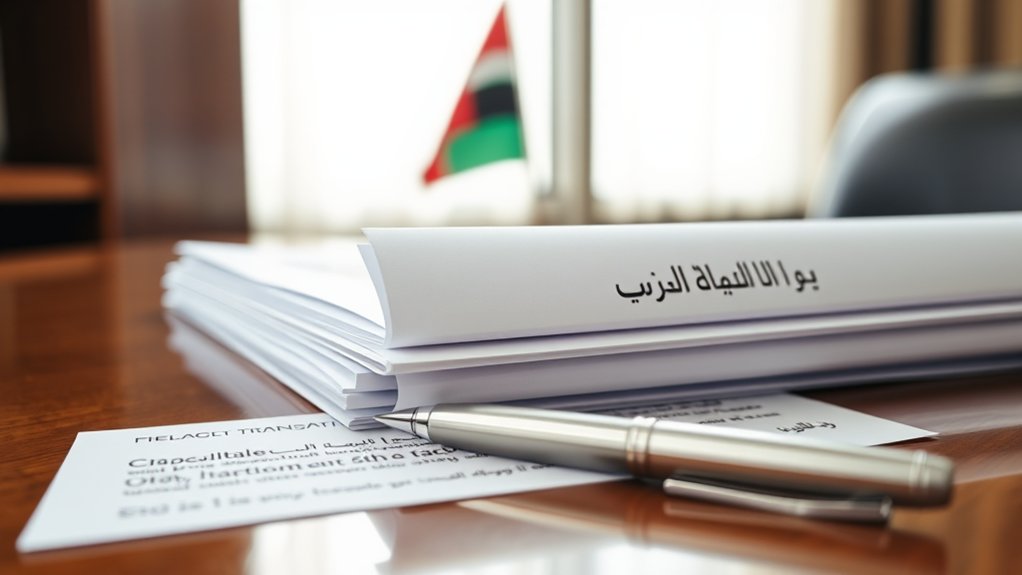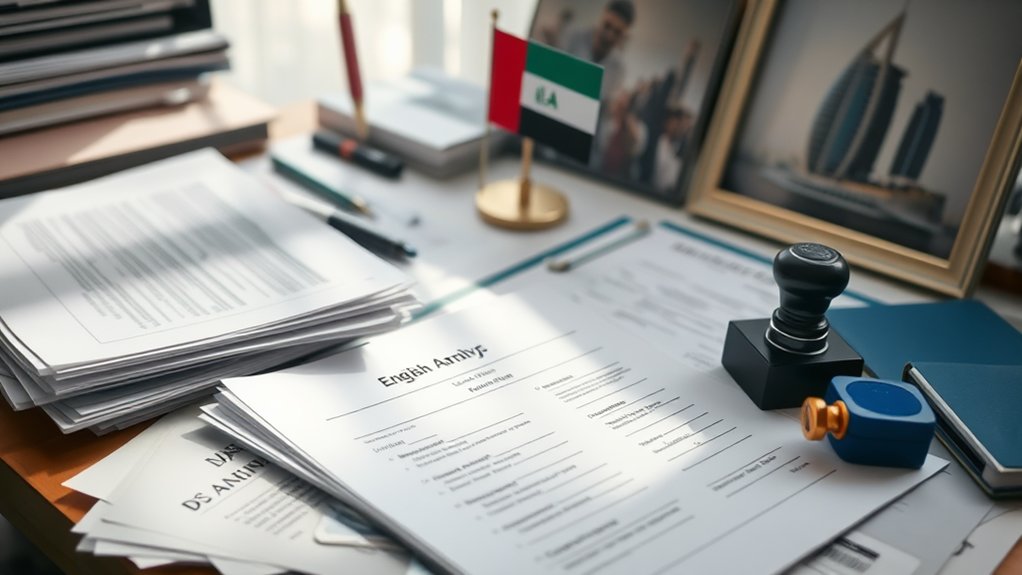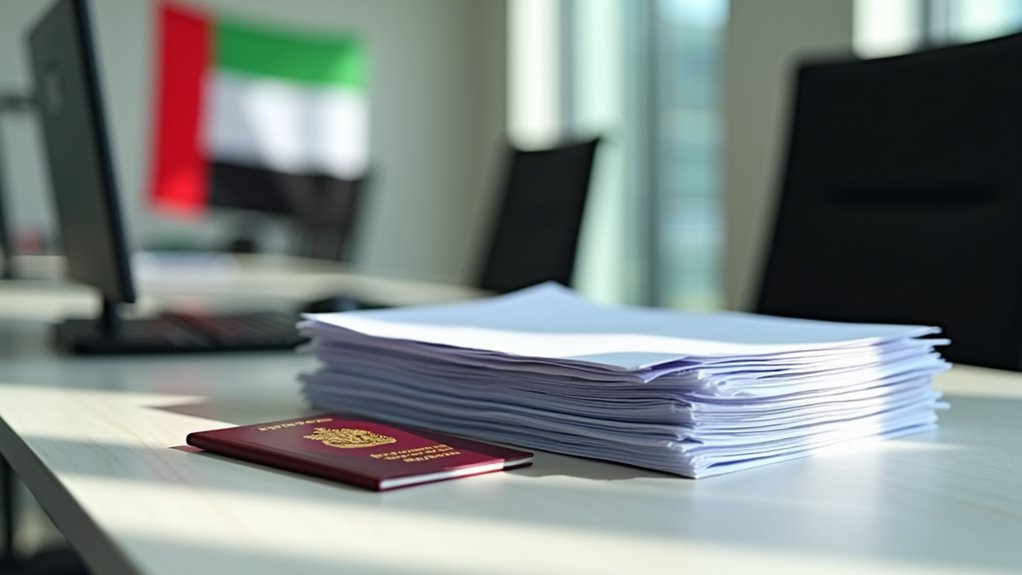You can't submit English-only documents for visa or licensing applications in the UAE without risking immediate rejection. The UAE mandates that all documents not originally in Arabic be translated into Arabic and certified to comply with local legal standards. This includes critical items like educational certificates and marriage licenses, which must accurately reflect original signatures and seals. Engaging professional translation services guarantees your documents meet these stringent requirements, thereby minimizing the chances of application delays or denials. Understanding the specifics of compliance can greatly impact your success, leading to enhanced clarity as you navigate the submission process.
Importance of Document Translation

When you're applying for a visa in the UAE, understanding the significance of document translation can't be overstated. All documents not originally in Arabic must undergo translation to comply with local visa and licensing requirements, guaranteeing acceptance by the relevant authorities. This requirement underscores the necessity of certified translations, which serve to verify the accuracy and authenticity of the translated materials. Failure to provide certified translations can lead to application rejections, causing delays and incurring additional costs in your visa or licensing process.
Moreover, it's vital that your translations include all signatures, seals, and formatting from the original documents. This attention to detail helps maintain their validity and guarantees that they meet the strict criteria outlined by UAE immigration and licensing authorities. Utilizing professional translation services is advisable, as they mitigate the risk of linguistic errors and assure adherence to established requirements. By entrusting your documents to experts, you enhance your chances of a smooth application process. Consequently, prioritize accurate document translation to streamline your experience and avoid unnecessary obstacles in achieving your visa or licensing goals in the UAE.
Additionally, it is crucial to remember that only certified translations are recognized by all UAE authorities, ensuring legal acceptance of your documents.
Types of Documents Requiring Translation
Understanding the types of documents that require translation is key to a successful visa application in the UAE. For any documents not originally in Arabic, you'll need to guarantee they undergo certified translations to comply with local regulations. These translations must be accurate and complete, incorporating all signatures and seals, reflecting the original documents faithfully.
Specific documents are required for translation, particularly legal documents associated with residency, employment, and licensing. Educational certificates, marriage licenses, and birth certificates frequently necessitate certified translations to be accepted by UAE authorities. Failing to provide these certified translations can lead to delays or even rejections in your visa application process, emphasizing the vital role of utilizing reliable translation services. Additionally, using business setup services can help streamline the overall process, ensuring all requirements are met efficiently.
It's essential to prioritize quality when seeking translation services, as non-certified translations may not meet the stringent requirements set forth by the UAE. By guaranteeing that your documents are accurately translated and certified, you position yourself favorably in the visa application process, helping to facilitate timely approvals and smooth changes in your relocation journey. Always verify that the translation service you choose is recognized by the UAE authorities to avoid unnecessary complications.
Certification and Attestation Requirements

To confirm your visa application is processed smoothly in the UAE, it is vital to meet the certification and attestation requirements for your documents. For any documents not originally in English, you'll need to obtain certified translations before submission. These translations must be full and direct, accurately reflecting every detail of the original documents, including signatures and seals. Failing to adhere to these standards could lead to delays or outright rejections of your application.
It's important to note that specific translation requirements may vary depending on the type of visa or licensing application you're pursuing. As a result, consulting the UAE's official visa services for detailed guidelines is imperative. Engaging reliable translation services that specialize in certified translations can greatly streamline your application process. Additionally, you should consider utilizing attestation services in Dubai to ensure your documents meet local requirements.
Furthermore, confirm that all required documents align with the expectations of the relevant government authorities and Immigration Authorities. By fulfilling the certification and attestation requirements diligently, you not only enhance your likelihood of a successful application but also foster confidence in the integrity of your submitted materials. Prioritizing these steps will pave the way for a more efficient visa experience in the UAE.
Process for Translating Documents
When you're preparing to submit your visa application in the UAE, understanding the translation requirements is essential. You'll need to guarantee that all documents not originally in Arabic are accurately translated into either Arabic or English, ideally through accredited translation services. Adhering to these guidelines not only streamlines document submission procedures but also minimizes the risk of application rejection due to discrepancies or non-compliance.
Translation Requirements Overview
If you plan to submit documents for a visa or licensing application in the UAE, it is essential to know that any document not originally in Arabic must be translated into Arabic. The translation requirements for these applications are stringent, necessitating certified translations for official documents to guarantee their accuracy and authenticity.
The translation process involves converting documents in full, which includes confirming that all signatures and seals are accurately reflected. It's critical that the translated documents match the original ones precisely; any discrepancies can lead to application rejections, causing unnecessary delays in your visa applications.
To navigate this process effectively, consider utilizing accredited translation services. These services are recognized by embassies and can help you meet all translation requirements efficiently. By opting for reputable providers, you mitigate the risk of errors and ensure that your documents are compliant with local regulations. Ultimately, investing in professional translations not only safeguards against potential application rejections but also enhances the likelihood of a smooth and successful application process. Additionally, ensure that you are aware of the visa validity checks to avoid any legal issues during your application.
Document Submission Procedures
Before submitting your visa application, it's vital to understand the process of translating your documents. If your documents aren't in English, you'll need a valid translation to comply with UAE visa requirements. This translation must be certified to guarantee accuracy and adherence to the standards set for visa applications.
It's important that the translated documents mirror the original ones precisely, including all signatures and seals. Failing to do so could jeopardize your application. Since specific translation requirements may vary, consulting the UAE's official visa services is a wise step to make sure you're fully informed.
Employing professional translation services can greatly mitigate the risk of linguistic errors that might lead to delays or even rejections of your application. These professionals are well-versed in the nuances of legal documentation, which is vital for maintaining compliance with the UAE's regulatory framework.
Consequences of Submitting English-Only Documents

When you submit English-only documents for your visa application in the UAE, you risk non-compliance with local language requirements, which typically mandate translations into Arabic or certified English. This oversight can lead to application rejections, necessitating resubmission and prolonging the process considerably. To prevent such complications, it is crucial to understand the specific language requirements and verify all supporting documents meet the official standards set by UAE authorities.
Language Requirements Explained
Submitting English-only documents for your visa application in the UAE can lead to significant complications. The UAE mandates that all documents not originally in Arabic must be translated into either Arabic or English to guarantee compliance with local regulations. Failure to adhere to these language requirements may result in delays or even rejections of your application, as authorities typically require original Arabic documents for accurate verification.
To illustrate the importance of proper documentation, consider the following table:
| Document Type | Required Language |
|---|---|
| Birth Certificates | Arabic or Certified English |
| Marriage Certificates | Arabic or Certified English |
| Educational Credentials | Arabic or Certified English |
| Employment Letters | Arabic or Certified English |
| Financial Statements | Arabic or Certified English |
Certified translations are often essential for non-English documents, ensuring that they are accurately rendered and legally recognized. Non-compliance with these requirements can lead to additional processing times, necessitating submission of translations post-application. To navigate these complexities seamlessly, it's prudent to consult the UAE's official visa services for specific language requirements relevant to your application.
Risks of Rejection
Failing to provide the necessary translations can lead to immediate rejection of your visa application in the UAE. If you submit visa documents that are only in English, you risk non-compliance with local language requirements, which may mandate that all relevant documents be translated into Arabic. Authorities often require certified translations to guarantee accuracy and reliability; inadequate or non-certified translations can be deemed unacceptable, exacerbating the risk of rejection.
Moreover, certain visa applications explicitly stipulate the need for these certified translations, and neglecting this requirement not only jeopardizes your application but can also result in significant delays. It's vital to confirm that all signatures and seals on translated documents match those on the originals, as discrepancies can further complicate your situation.
For applicants from countries with specific documentation requirements, the likelihood of rejection increases substantially without attention to local language mandates. Consequently, to navigate the complexities of the UAE's visa application process effectively, prioritize obtaining accurate translations from professional services, which will enhance your chances of a successful outcome.
Tips for Ensuring Compliance
To guarantee compliance with UAE visa requirements, it's crucial to have all non-English documents translated accurately into English. This process guarantees you'll meet the language requirements mandated by UAE regulations, reducing the risk of delays or rejections in your visa applications. You're required to present certified translations that match the original documents precisely, including signatures and seals.
Here are some tips for ensuring compliance:
| Tip | Details |
|---|---|
| Use Professional Services | Engaging professional translation services guarantees accuracy. |
| Validate Document Length | Confirm documents are valid for at least the required duration. |
| Check for Certification | Verify that translations are certified by recognized authorities. |
| Consult Official Sources | Always consult UAE's official visa services for specific language requirements. |
Frequently Asked Questions
What Documents Are Required for UAE Visa Stamping?
For UAE visa stamping, guarantee you meet visa documentation requirements, including valid passports and medical certificates. Verify document authenticity, follow submission guidelines explained, and consider legal advice to avoid common mistakes impacting processing time.
What Is the Most Important Documents for Visa Application?
When preparing your visa application essentials, focus on document translation requirements and common application mistakes. Make certain you've the right supporting paperwork types, as the document verification process can reveal critical visa rejection reasons if overlooked.
How Many Days Will It Take for Visa Processing in the UAE?
Visa processing duration in the UAE varies; standard processing times are 3 to 4 days for online applications. Factors affecting processing include document accuracy, while urgent visa services can expedite typical processing delays.
What Documents Are Required for UAE Work Permit?
For your UAE work permit, you'll need a valid passport, residency visa, labor card, and attested academic certificates. Verify you complete the application process and fulfill medical fitness and document verification requirements as per employer sponsorship guidelines.
Conclusion
In maneuvering the complexities of visa or licensing applications in the UAE, remember that "an ounce of prevention is worth a pound of cure." Submitting English-only documents can lead to significant delays or outright rejections, undermining your efforts. To guarantee compliance, meticulously translate your documents into Arabic, and adhere to the requisite certification and attestation protocols. By doing so, you not only bolster your application's integrity but also enhance your chances of a successful outcome in this critical process.



